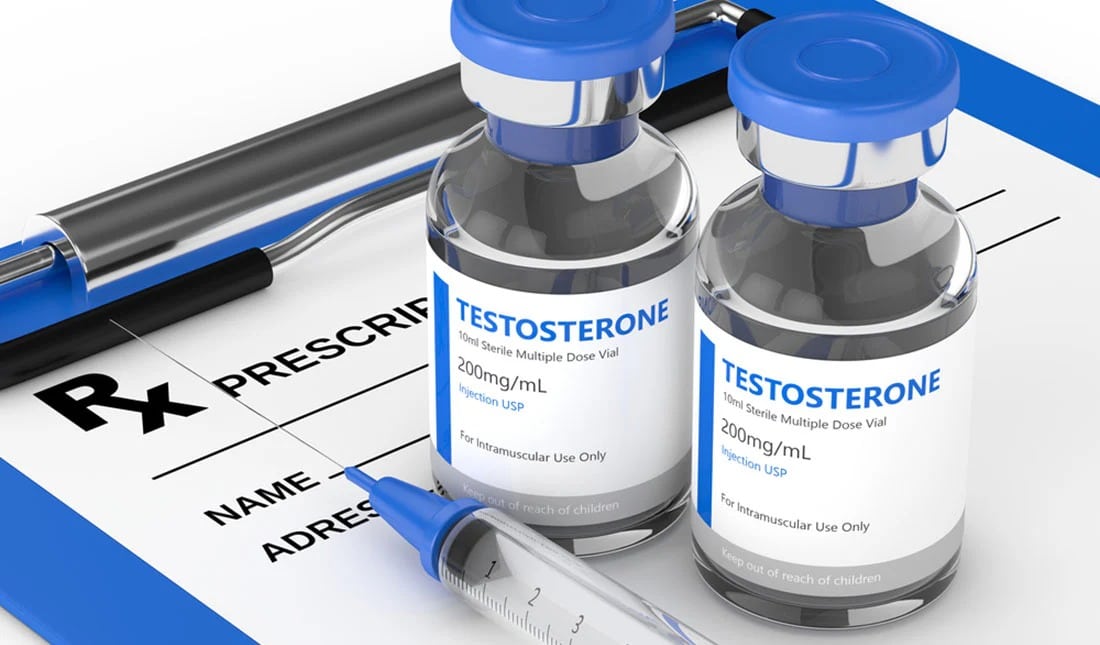552
Testosterone replacement therapy can be helpful for health problems and signs of aging. You can try a change of diet first.
Testosterone replacement therapy: All information
Testosterone replacement therapy (TRT) is a medical treatment that increases testosterone levels in people whose bodies do not produce enough testosterone.
- Testosterone therapy is prescribed by a doctor when men suffer from hypogonadism, an underactive testicle. Since hormones are produced here, the disease causes a deficiency that results in further symptoms such as decreasing bone density, fatigue, depression, decreased libido, erectile problems or muscle loss.
- In addition to reasons such as illness and age, factors such as chronic stress, lack of sleep, obesity, unhealthy diet, alcohol consumption, drug abuse, certain medications and environmental toxins can lead to a testosterone deficiency. These influences disrupt hormone regulation and lower testosterone levels.
- Men with normal testosterone levels have to pay for the therapy themselves. Studies have not yet been able to prove the alleged positive effect on erectile function and sexual quality of life. If you do decide to undergo therapy, you should definitely find a doctor to supervise it.
- Many young men choose TRT to increase their muscle mass. However, this can be dangerous because it suppresses the body’s own testosterone production, which can lead to infertility and dependence on the therapy in the long term. It can also increase the risk of cardiovascular disease, prostate enlargement, acne and hormonal imbalances.
- These side effects can also occur in older patients. Other side effects include mood swings, hair loss and gynecomastia.
- Testosterone replacement therapy can be provided by injections, gels or patches, oral tablets or capsules, and implanted pellets. These methods provide a continuous intake of testosterone into the body, as needed and tolerated by the individual.
- The costs of TRT can vary greatly depending on the form of treatment, the country in which it is carried out, and whether the insurance covers part of the costs. In Germany, they can range from around 30 to 150 euros per month.
Increase testosterone through diet
If you want to increase your testosterone level naturally, you should make sure you get enough sleep, exercise regularly and keep your stress levels low. Diet can also play an important role in supporting and increasing testosterone levels. Studies show that a diet with a good balance of healthy fats, proteins and carbohydrates is beneficial.
- Eating enough high-quality protein, such as that found in meat, fish, eggs, dairy products, nuts and legumes, can help boost testosterone production.
- Zinc is an essential mineral for testosterone production. Foods such as oysters, red meat, poultry, nuts, seeds (especially pumpkin seeds) and legumes are good sources.
- A sufficient vitamin D level is important for hormone production. Foods such as fatty fish (salmon, mackerel), eggs and fortified products can help. Sunlight is also an important source of vitamin D.
- Healthy fats can support testosterone production. So go for avocados, olive oil, nuts and oily fish.
- A diet high in sugar and highly processed foods can increase insulin levels and lower testosterone levels. Therefore, it is better to avoid too much sugar and processed foods.
- Vegetables such as broccoli, cauliflower and kale can help lower estrogen levels and thus improve the testosterone to estrogen ratio.
- Fruits and vegetables that are high in antioxidants (e.g. berries, nuts, leafy green vegetables) can promote overall health and reduce hormonal imbalances.
- Excessive alcohol consumption can lower testosterone levels, so keep it moderate.

